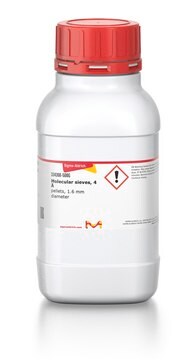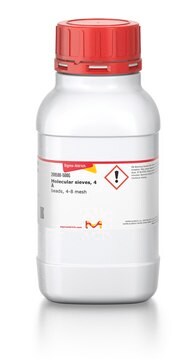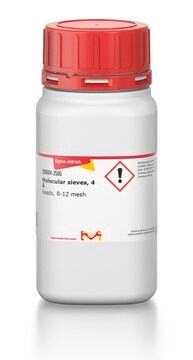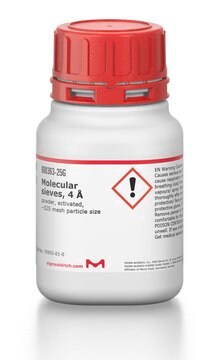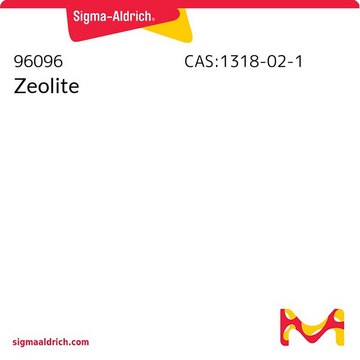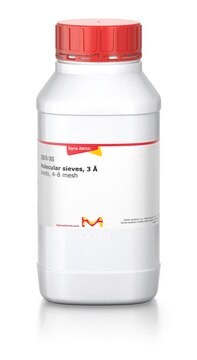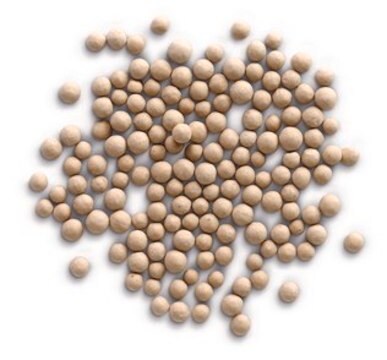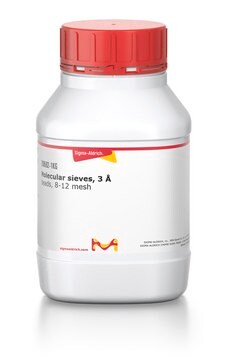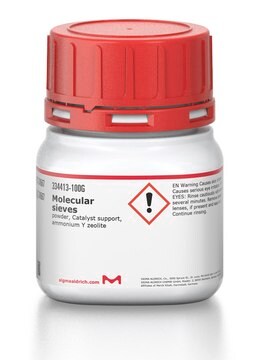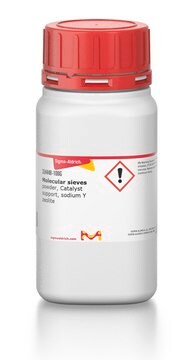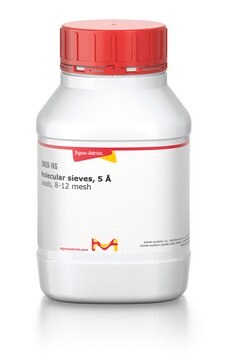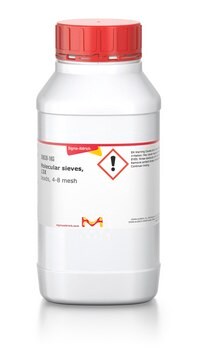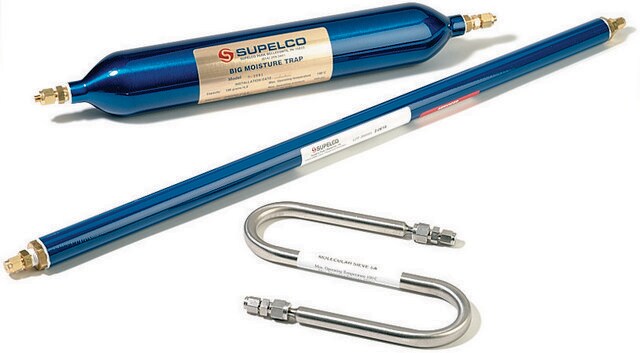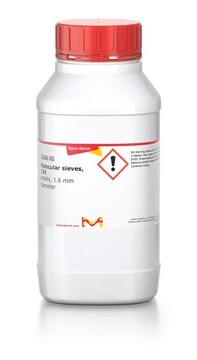すべての画像(1)
About This Item
化学式:
Na12[(AlO2)12(SiO2)12] · xH2O
CAS番号:
MDL番号:
UNSPSCコード:
23201100
eCl@ss:
32110204
NACRES:
NA.21
おすすめの製品
フォーム
pellets
直径
3.2 mm
ポアサイズ
4 Å
類似した製品をお探しですか? 訪問 製品比較ガイド
関連するカテゴリー
詳細
Choosing a Molecular Sieve:
1. The preferential adsorption of one molecule over another depends upon pore diameter and mesh size.
2. The dynamic capacity of the silica gel for adsorbing a particular compound is governed by the internal surface area; the greater the surface area, the greater the dynamic capacity.
3. Rate of adsorption and sharpness of resolution are dependent chiefly on particle size and column packing; a fine particle size gives optimum sharpness of resolution.
4. Liquids are most readily adsorbed from solvents in which they are least soluble; a good solvent makes a good desorbing agent.
5. Highly polar liquids are readily adsorbed. Compounds having hydroxyl groups, or containing oxygen are strongly adsorbed.
6. For similar compounds, the higher the molecular weight the higher the selectivity.
7. For hydrocarbons of similar molecular weight, adsorptivity increases with the number of double bonds.
1. The preferential adsorption of one molecule over another depends upon pore diameter and mesh size.
2. The dynamic capacity of the silica gel for adsorbing a particular compound is governed by the internal surface area; the greater the surface area, the greater the dynamic capacity.
3. Rate of adsorption and sharpness of resolution are dependent chiefly on particle size and column packing; a fine particle size gives optimum sharpness of resolution.
4. Liquids are most readily adsorbed from solvents in which they are least soluble; a good solvent makes a good desorbing agent.
5. Highly polar liquids are readily adsorbed. Compounds having hydroxyl groups, or containing oxygen are strongly adsorbed.
6. For similar compounds, the higher the molecular weight the higher the selectivity.
7. For hydrocarbons of similar molecular weight, adsorptivity increases with the number of double bonds.
Regeneration or Activation:
A saturated molecular sieve can be restored to its original capacity by regeneration, the principle of which involves changing the conditions surrounding the adsorbent to correspond to a very low equilibrium capacity. In general, the greater the difference between the equilibrium capacities of adsorption and regeneration, the more rapid and complete the regeneration.
The sieve may be regenerated in one of four ways:
1. Thermal reactivation –The maximum regeneration temperature for Silica is 300°C.
2. Pressure reactivation
3. Passing an appropriate fluid through the gel bed at normal temperature and pressure.
4. Displacement of adsorbates by passing a high concentration of molecules in a fluid through the bed.
A saturated molecular sieve can be restored to its original capacity by regeneration, the principle of which involves changing the conditions surrounding the adsorbent to correspond to a very low equilibrium capacity. In general, the greater the difference between the equilibrium capacities of adsorption and regeneration, the more rapid and complete the regeneration.
The sieve may be regenerated in one of four ways:
1. Thermal reactivation –The maximum regeneration temperature for Silica is 300°C.
2. Pressure reactivation
3. Passing an appropriate fluid through the gel bed at normal temperature and pressure.
4. Displacement of adsorbates by passing a high concentration of molecules in a fluid through the bed.
アプリケーション
- Biomimetic Dual Absorption-Adsorption Networked MXene Aerogel-Pump for Integrated Water Harvesting and Power Generation System: This study demonstrates the use of 4A molecular sieves in creating a biomimetic network that integrates water harvesting with power generation, showcasing a novel application in sustainable technology (Cai et al., 2024).
- Utilization of transition metal fluoride-based solid support catalysts for the synthesis of sulfonamides: This paper discusses the use of 4A molecular sieves as catalyst supports in the synthesis of sulfonamides, providing insights into their versatility in pharmaceutical applications (Ali et al., 2022).
- Immobilization of Cadmium by Molecular Sieve and Wollastonite Is Soil pH and Organic Matter Dependent: The study indicates the potential of 4A molecular sieves in environmental remediation, particularly in the immobilization of heavy metals such as cadmium in soils (Dong et al., 2021).
保管分類コード
11 - Combustible Solids
WGK
WGK 3
引火点(°F)
Not applicable
引火点(℃)
Not applicable
適用法令
試験研究用途を考慮した関連法令を主に挙げております。化学物質以外については、一部の情報のみ提供しています。 製品を安全かつ合法的に使用することは、使用者の義務です。最新情報により修正される場合があります。WEBの反映には時間を要することがあるため、適宜SDSをご参照ください。
Jan Code
334294-25KG:
334294-VAR:
334294-BULK:
334294-5KG:
334294-1KG:
この製品を見ている人はこちらもチェック
ライフサイエンス、有機合成、材料科学、クロマトグラフィー、分析など、あらゆる分野の研究に経験のあるメンバーがおります。.
製品に関するお問い合わせはこちら(テクニカルサービス)